Safe Spaces and 21st Century Democracies - Open Gov #07
We highlight news that evidences the need for governmental openness. November 2021.
Available in:
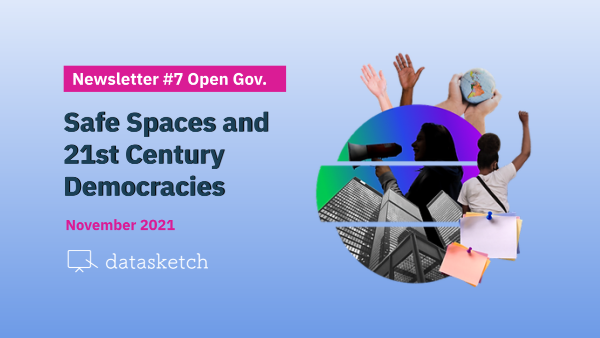
We are Laura Tamia Ortiz, Gabriel Jiménez, María Juliana Rodríguez and Juan Pablo Marín Día, a part of the Datasketch Open Government team. If you want to read previous issues, you can do it here: Open Government Newsletter or, if you prefer, you can read this one in your browser.
Have you reached us through social networks, or have you been forwarded this newsletter and want to receive it in your email twice a month? Subscribe!
#EVENTS
The last months of the year are full of exciting events that challenge global governance so that you will find many highlights in this issue. From the 2021 OGP Global Summit, which will take place in Seoul, and the events leading up to it, we show you a selection of some of those that we believe will set the agenda for 2022.
Summit for Democracy
On December 9-10, 2021, the United States will host a virtual Summit for Democracy for leaders from government, civil society, and the private sector. “It will focus on the challenges and opportunities facing democracies and provide a platform for leaders to commit, both individually and collectively, to defend democracy and human rights around the world.” You can register and find all the information at Summit for Democracy - Virtual Event
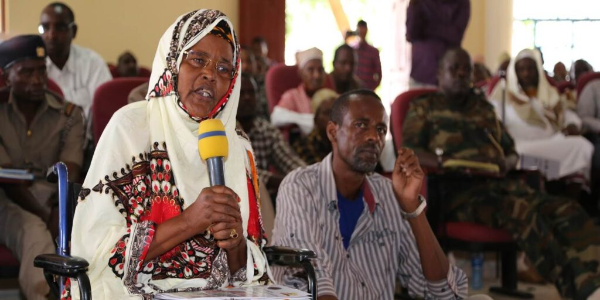
Source: Hank Nelson, USAID, licensed under CC BY-NC 2.0. Vía: The Summit for Democracy - United States Department of State.
XXVI Congress Colombia 2021 - Latin American Center of Administration for Development
The Latin American Center of Administration for Development (CLAD) holds its International Congress on the State and Public Administration Reform every year. The sixteenth edition will take place in Bogota, Colombia, from November 23-26, 2021, with the slogan “Closeness to the citizen: digitalization and local management” and will allow virtual participation of attendees.
Find all the information at XXVI Congress Colombia 2021 - Latin American Center of Administration for Development.
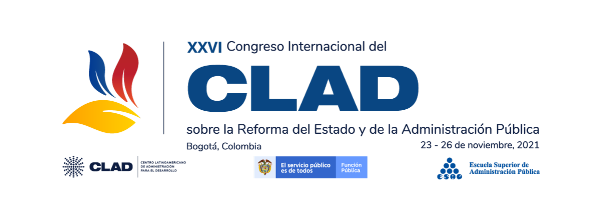
Connected Cities & Towns Summit
On December 7, the Connected Cities & Towns Summit will be held virtually, which seeks to leverage technology and innovation to address regional and local challenges identified in cities worldwide. The COVID-19 pandemic evidenced the need for digital transformation and increased connectivity through improvements in digital planning.
Several topics related to governance and open data in digital planning will be discussed: funding mechanisms for smart cities, using real-time data to inform decision-making, and how the internet of things will be used in intelligent environments. On the summit’s official website, you can book your tickets, see the full schedule and the invited panelists.
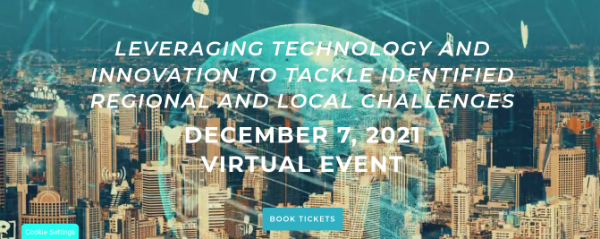
CILA 2021
CILA 2021 is a virtual space for regional exchange organized by Ciudadanía_Inteligente and Asuntos del Sur. Various stakeholders interested in openness, transparency, gender focus, and sustainability share their experiences and lessons to respond to governance and public management challenges. It took place between November 9 and 11.
It is divided into three themes or challenges addressed through panels, working tables, and virtual stands, which allow sharing and discovering regional experiences: Transparent and Participatory Governments, Gender, Diversity and Inclusion, and Environmental Democracy and Sustainable Cities. You can read our coverage of the first panel, “Participatory and Transparent Governments,” and find the rest of the information on the event’s website.

#PODCAST
Protecting whistleblowers
Protecting whistleblowers is one of the significant challenges in the fight against corruption and citizen participation, proof of which are the multiple initiatives in different formats worldwide to put this issue on the public agenda.
In a new episode of its GovExec Daily podcast, entitled The Importance of Protecting Whistleblowers, Government Executive spoke with Dana Gold, senior advisor and director of education at Government Accountability Project, non-profit whistleblower protection and advocacy organization. The discussion addresses the lack of legal protection for people who choose to report cases of fraud, corruption, or wrongdoing in the public and private sectors.
Gold refers to recent cases, such as that of Frances Haugen and three other former Facebook workers who denounced the role of this network in the conscious dissemination of disinformation. The episode can also be found on Apple Podcasts, Spotify, Amazon Music, and Stitcher.
If you want to complete this information, you can read Gold’s article for Government Executive, in which he addresses this issue in-depth and analyzes the state of the law in the United States.
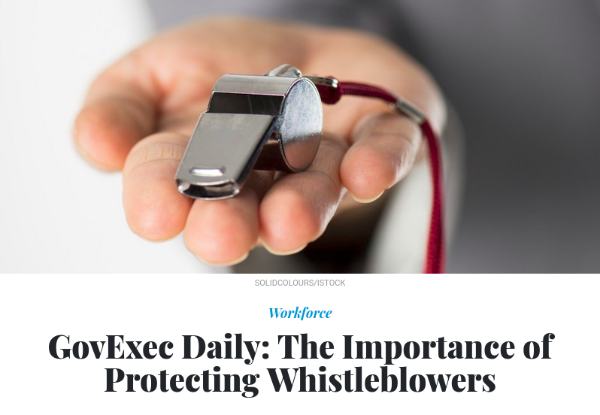
Safe spaces for whistleblowing in Latvia
The Open Government Partnership recently launched a podcast in English called Voices of Open Government. Its new episode demonstrates that whistleblower protection is also high on its agenda, addressing the issue of “safe spaces” for whistleblowers, using Latvia as an example. There, the government is working with civil society organizations to raise awareness about the importance of whistleblowing and the guarantees provided by the 2018 Whistleblower Law.
In addition, together with Inese Taurina, executive director of Transparency International - Latvia, they discuss the systems in place to protect the identity of public employees and members of social organizations who choose to whistleblow. The episode, titled Blowing the Whistle on Corruption in Latvia, is available on Apple Podcasts, Spotify, and other streaming platforms.
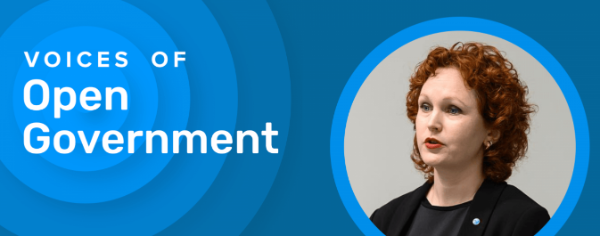
#NEWS
The pandemic and the labor crisis in the U.S.
The COVID-19 pandemic generated crises of various kinds in the world. For example, in the United States, the labor crisis has increased, and more and more citizens are quitting their jobs. According to the latest JOLTS report, 4.4 million citizens quit during September.
Anthony Klotz, a professor at Texas A&M University’s School of Business, sees four factors playing a role in “The Big Quit” phenomenon: many workers planned to leave their jobs but postponed the decision because of the pandemic; job burnout; revelations, or epiphanies related to reevaluating their lives; and adjusting to telecommuting. This visualization by Felix Richter shows how this problem has evolved and is an example of how data and transparency make it possible to communicate messages simply.
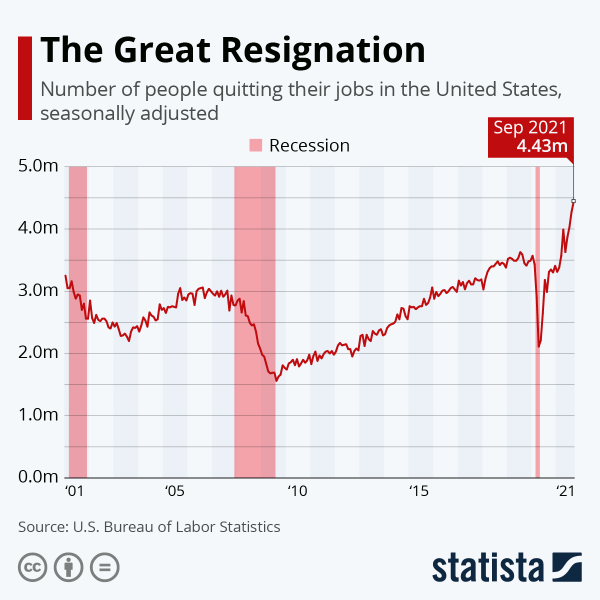
COVID-19 and its rapid increase in Europe
The European Center for Disease Prevention and Control publishes a weekly report on the epidemiological situation in Europe. As of November 7, there is evidence of an increase in the new cases of infection and a mortality rate which, although low, is on the rise. Indicators support this information for each country and graphs that allow visualization of the epidemiological changes during the week analyzed.
Reports such as this one are important because they provide access to data on the pandemic and allow us to know the actions that local and regional authorities are taking to control the spread of the disease. In addition, it is helpful to have tools such as the Pandemic Data Sheets, created by Open Data Charter, which functions as a type of COVID-19 taxonomy. Its purpose is to provide further consistency to published pandemic data and point out areas where standardization and cooperation between governments can be improved. If you want to know more, you can consult the complete document on the Fact Sheets.
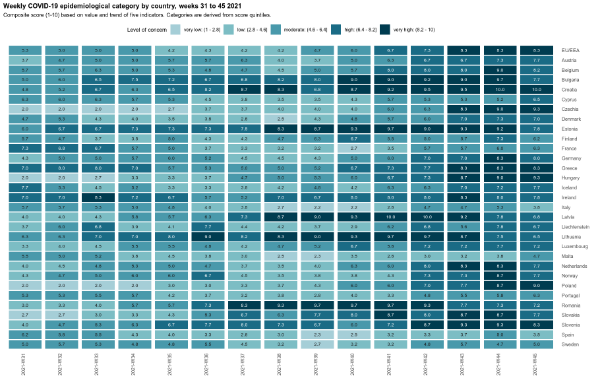
Source: Week 45, 2021
#Training
Open Justice.
The GovLab and New York University offer a free course on Open Justice. On it, Beth Noveck, the GovLab director, teaches how to use technology, data, and innovation to improve the legal system, presenting open justice projects and explaining how to create your open justice project. You can register at EDX - Open Justice.
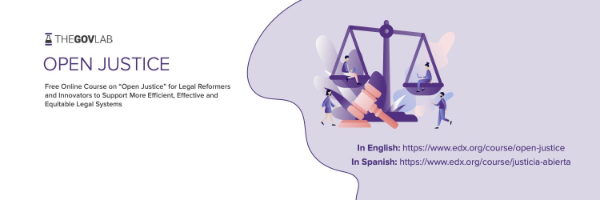
#RECURSES
DOLLAR STREET
Dollar Street is a tool created by Anna Rosling Rönnlund from Gapminder, intending to facilitate access to and use public data by showing how people live through stories and images. For this initiative, a group of photographers visited 50 countries, documenting more than 264 families. Each photographer captured the objects that make up the homes. With the premise that “In the news, people from other cultures seem stranger than they are.” They show this catalog of households, ranked from left to right by income.
Gapminder fights against misconceptions related to global development based on a vision of the world that starts from facts understandable to all. It produces didactic resources based on statistics.
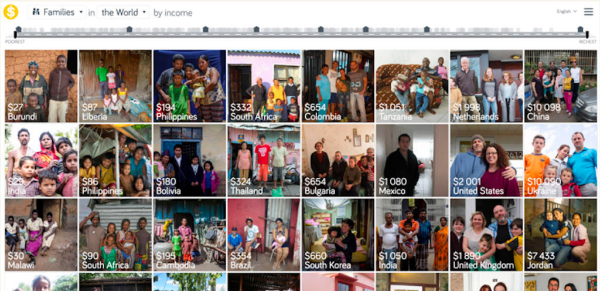
AI and climate change - Recommendations for government action
Artificial intelligence is an alternative to combat the growing problem of climate change. It can, among other things, predict solar energy production, optimize heating, track deforestation and analyze corporate finances. This report by GPAI: Global Partnership on Artificial Intelligence offers recommendations on how governments can responsibly employ this technology to address the climate crisis. They are grouped into three categories: using AI responsibly, reducing its negative impacts, and building assessment and governance capabilities.

Democracies for the 21st century
The UserCentriCities project has published a report on the need to put citizens in direct contact with digital government, showcasing six successful European projects from the cities of Bologna and Milan (Italy); Murcia (Spain); Espoo (Finland); Rotterdam (Netherlands) and Tallinn (Estonia).
The analysis by David Osimo, Chrysoula Mitta and Charlotte van Ooijen from The Lisbon Council for Economic Competitiveness and Social Renewal is based on interviews with officials. It analyzes trends that promote the progress of digital services in the public and private sectors.
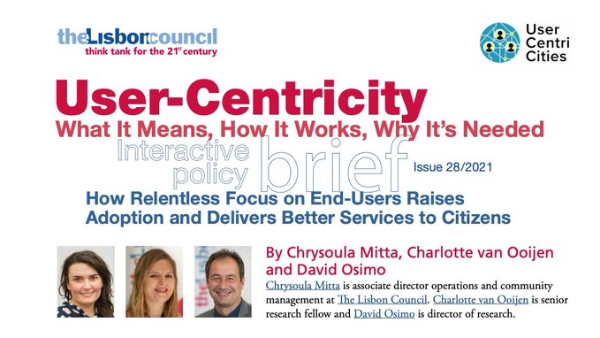
That’s all for now!
If you liked this content, we invite you to share it!
If you have reached us through social networks or have been forwarded this newsletter and want to receive it in your email twice a month, please subscribe!
We have other newsletters that may interest you in Data Journalism and Data Culture.
Here you can update your preferences and unsubscribe from all our notifications.




